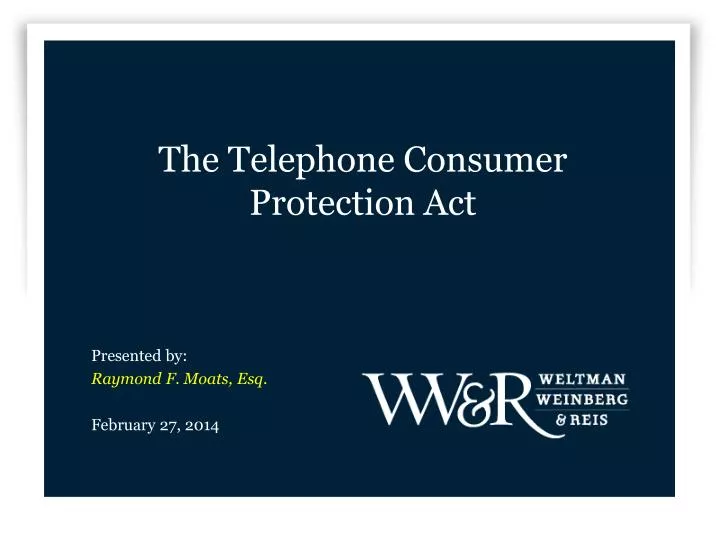
The CAN-SPAM Act made a minor amendment to the TCPA to explicitly apply the TCPA to calls and faxes originating from outside the U.S. In 2013, the Philadelphia Federal Appeals Court held that consent to receive calls from collectors, banks, or telemarketers to consumers' cell phones may be revoked by the consumer. After being challenged in court by the telemarketing industry, the National Do Not Call Registry received Congressional ratification in the speedy enactment of Do-Not-Call Implementation Act. In 2003, the Federal Trade Commission - not the FCC and not the agency entrusted with the TCPA - established the National Do Not Call Registry and implemented regulations prohibiting commercial telemarketers from making unsolicited sales calls to persons who did not wish to receive them. The FCC's initial do-not-call list regulations were ineffective at proactively stopping unsolicited calls because the consumer had to make a do-not-call request for each telemarketer. Congress suggested that the FCC's do-not-call regulations "may require the establishment and operation of a single national database." The FCC did not adopt a single national database but rather required each company to maintain its own do-not-call database. When Congress passed the TCPA in 1991, it delegated the do-not-call rules to the FCC. In the event of a willful violation of the TCPA, a subscriber may sue for up to three time the damages, i.e.In the event of a violation of the TCPA, a subscriber may (1) sue for up to $500 for each violation or recover actual monetary loss, whichever is greater, (2) seek an injunction, or (3) both.Prohibits unsolicited advertising faxes.


Prohibits autodialed calls that engage two or more lines of a multi-line business.Prohibits any call made using automated telephone equipment or an artificial or prerecorded voice to an emergency line (e.g., "911"), a hospital emergency number, a physician's office, a hospital/health care facility/elderly room, a cellular telephone, or any service for which the recipient is charged for the call.Prohibits solicitations to residences that use an artificial voice or a recording.Requires solicitors provide their name, the name of the person or entity on whose behalf the call is being made, and a telephone number or address at which that person or entity may be contacted.Requires solicitors honor the National Do Not Call Registry.Requires solicitors maintain a company-specific "do-not-call" (DNC) list of consumers who asked not to be called the DNC request must be honored for 5 years.Prohibits solicitors from calling residences before 8 a.m.Unless the recipient has given prior express consent, the TCPA and Federal Communications Commission (FCC) rules under the TCPA generally: It also specifies several technical requirements for fax machines, autodialers, and voice messaging systems-principally with provisions requiring identification and contact information of the entity using the device to be contained in the message.

The TCPA limits the use of automatic dialing systems, artificial or prerecorded voice messages, SMS text messages, and fax machines. The TCPA restricts telephone solicitations (i.e., telemarketing) and the use of automated telephone equipment.

It amended the Communications Act of 1934. The Telephone Consumer Protection Act of 1991 ( TCPA) was passed by the United States Congress in 1991 and signed into law by President George H.


 0 kommentar(er)
0 kommentar(er)
